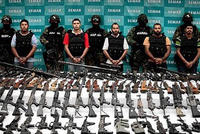-
NRA leader tells gun owners Obama does not understand them
Reacting to President Obama proposals for tighter gun controls, Wayne LaPierre, the executive vice president of the National Rifle Association (NRA), told gun owners on Tuesday that President Obama does not understand them. He said the president wanted to institute a national registry of firearms so he can tax or confiscate their weapons.
-
-
New imaging technique for identifying the age and sex of a corpse
Researchers have developed a new technique for identifying the age and sex of a corpse. It is based on a computing system which relies on free software, and has a reliability of 95 percent.
-
-
Mexican officials hope for real changes in U.S. gun policy

The majority of the guns used in drug-related violence in Mexico have come from the United States. Numbers from the Bureau of Alcohol, Tobacco Firearms and Explosives show that almost 70 percent of the 99,000 weapons seized in Mexico in 2012 came from the United States. Mexican officials are hoping that president Obama’s speeches on changing the U.S. gun policy will be more than just talk.
-
-
Controversial full-body scanners at U.S. airports to be replaced
The controversial full-body airport scanners which upset many passengers because of the anatomically accurate images they produced, will be removed from U.S. airports by June, according to the Transportation Security Administration(TSA), ending a $40 million contract with Rapiscan Systems, the manufacturer of the scanners. Rapiscan’s backscatter X-ray scanners are being replaced by less intrusive millimeter wave scanners.
-
-
More states move to restrict access to personal information of gun holders
Currently, thirty-five states do not provide access to information on people who have gun licenses, except to law enforcement. Some of the states where access to such information is permitted, are now moving toward restricting such access.
-
-
Revealing full-body scanners to be removed from airports
One of the more controversial post-9/11 security devices, the ubiquitous and uncomfortably intrusive full-body scanners, will be removed from service by the Transportation Security Administration (TSA). On Friday, the agency announced it would begin to remove the scanners from U.S. airports this summer. The anatomically revealing backscatter scanners are being replaced by the ore discreet millimeter wave devices.
-
-
Five people injured as guns go off at gun shows

“Gun Appreciation Day” rallies were held in cities around the country this weekend, and gun shows were doing brisk business; five people were injured as guns went off accidentally in three such shows.
-
-
Police experience enlivens classroom teaching
Dennis Marsili spent twenty-seven years as a police officer in the Pittsburgh area, and has attained a vast amount of knowledge which he is now passing on to people who want to work in law enforcement in the future.
-
-
The president’s 23 executive actions to curb gun violence
President Obama yesterday announced a comprehensive plan to reduce gun violence in the United States. The president called on Congress to reinstate an assault-weapon ban which expired in 2004 and enact other laws to tighten gun regulations. He said, though, that while Congress deliberates, the administration would take twenty-three separate actions aiming to reduce gun violence — actions which do not require congressional approval.
-
-
Minnesota counties police make big money from drug seizures
In 2011, law enforcement in southern Minnesota made a significant profit off crime busts. State Auditor Rebecca Otto released the Criminal Forfeitures Report last month, which offers information on the amount of cash and property seized by Minnesota law enforcement agencies.
-
-
Police officers in Louisiana do not have to look for a ride home
Tighter budgets have had an effect on police departments everywhere. In Indianapolis, Indiana, and many other cities, police departments now charge officers a fee to take home their squad cars. Police departments in central Louisiana resist this trend. “This [taking home a squad car] is not a privilege,” says the director of the National Fraternal Order of Police. “It really is about maximizing response times and the ability of officers to be where they need to be.”
-
-
Obama unveils comprehensive proposal to curb gun violence
President Obama earlier today proposed the most comprehensive gun-control policies in a generation. He also initiated twenty-three separate executive actions aiming to curb what he called “the epidemic of gun violence in this country.” In addition to executive measures, the president called on Congress to pass legislation to ban assault weapons and high-capacity magazines for civilian use, and to require universal background checks for all gun buyers.
-
-
New York State votes for strict gun law
New York governor Andrew Cuomo yesterday signed into law a sweeping gun-control bill. The bill expands a ban on assault weapons, limits the size of magazines, includes measures to keep guns away from the mentally ill, and make penalties stiffer for using a gun in the commission of a crime. Cuomo signed the bill shortly after the State Assembly approved it by a 104-43 vote on the second day of the 2013 legislative session.
-
-
Obama on Wednesday will outline executive action to curb gun violence
President Obama on Wednesday will outline steps the administration can take without congressional approval to curb gun violence in the United States. Vice President Joe Biden told congressional leaders that there are nineteen separate actions the administration can take by using executive power. The president will emphasize that these executive measures are not an alternative to legislative action, and he will also announce his plan to push through Congress the most comprehensive reform of gun laws in two decades.
-
-
New York to make state’s strict gun laws even stricter
New York State is nearing an agreement on a proposal to put some of the toughest gun-control laws into effect. The laws include expanding the definition of banned assault weapons, limiting magazines to seven rounds, and requiring background checks on people who buy ammunition
-
- All
- Regional
- Water
- Biometrics
- Borders/Immig
- Business
- Cybersecurity
- Detection
- Disasters
- Government
- Infrastructure
- International
- Public health
- Public Safety
- Communication interoperabillity
- Emergency services
- Emergency medical services
- Fire
- First response
- IEDs
- Law Enforcement
- Law Enforcement Technology
- Military technology
- Nonlethal weapons
- Nuclear weapons
- Personal protection equipment
- Police
- Notification /alert systems
- Situational awareness
- Weapons systems
- Sci-Tech
- Sector Reports
- Surveillance
- Transportation
Advertising & Marketing: advertise@newswirepubs.com
Editorial: editor@newswirepubs.com
General: info@newswirepubs.com
2010-2011 © News Wire Publications, LLC News Wire Publications, LLC
220 Old Country Road | Suite 200 | Mineola | New York | 11501
Permissions and Policies
Editorial: editor@newswirepubs.com
General: info@newswirepubs.com
2010-2011 © News Wire Publications, LLC News Wire Publications, LLC
220 Old Country Road | Suite 200 | Mineola | New York | 11501
Permissions and Policies
